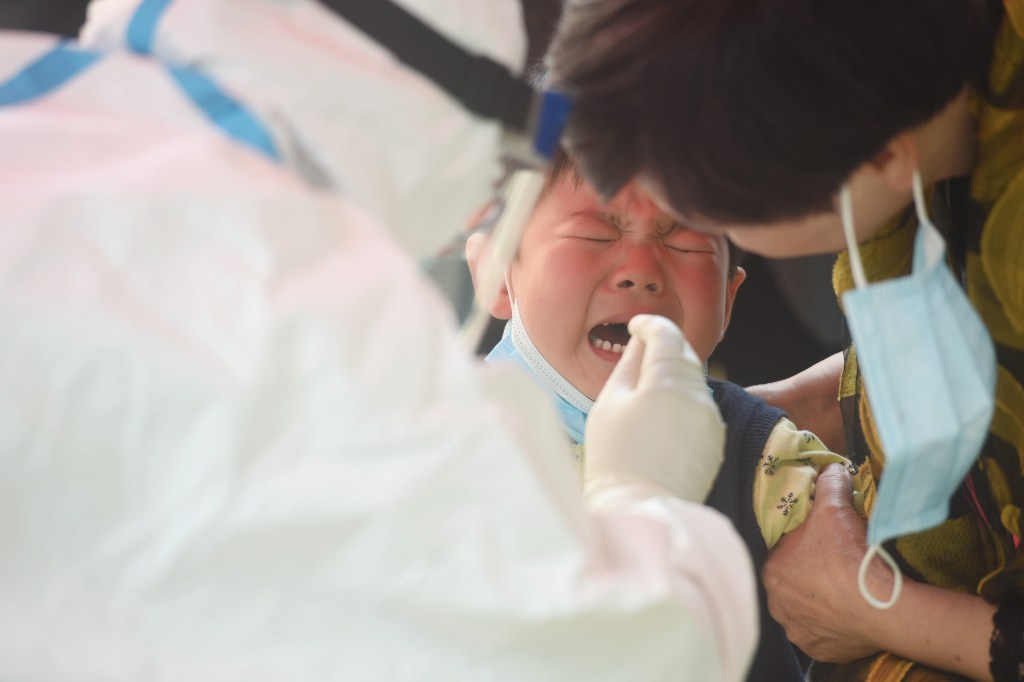In the second week of Nigeria’s national lockdown, Daniel Olawoye started suffering symptoms of malaria. He decided to avoid the cramped hospitals dealing with a rise in COVID-19 patients, but when his condition deteriorated two weeks later, his neighbour offered to take him on his bike to the nearest health centre, miles away from his home, in north-east Lagos, Nigeria’s commercial capital.
“The fever and headache became so severe that I thought of contacting the Nigerian Centre for Disease Control [NCDC], thinking it could be coronavirus and that I would die if nothing drastic is done,” Daniel told VICE News.
Videos by VICE
Olawoye did not have COVID-19, but he was suffering from malaria, a disease that killed more than 370,000 people across Africa in 2018.
Malaria has remained a leading cause of death in sub-Saharan Africa. Across the world it is the third leading killer of children under five, after pneumonia and diarrhoeal disease. Sub-Saharan Africa accounts for 93 percent of the cases and 94 percent of malaria deaths – almost 213 million cases out of 228 million people worldwide, according to the latest World Malaria Report. Six countries – Nigeria, the Democratic Republic of Congo, Uganda, Côte d’Ivoire, Mozambique and Niger – make up nearly 50 percent of the global malaria deaths.
In recent years, the region has made considerable progress in combating malaria and other infectious diseases, such as polio and Lassa Fever. The World Health Organisation (WHO) announced in 2015 that the global incidence of malaria had finally been slowed, largely due to a “massive rollout” of mosquito nets, anti-malaria drugs and the use of insecticides.
In 2000, just 2 percent of the then 667 million people living in sub-Saharan Africa slept under mosquito nets. By 2015, about half of Africa’s 1 billion population were sleeping under mosquito nets.
Much of this progress was made possible by global partnerships and funding schemes established back in 2000. A notable partnership is the Roll Back Malaria (RBM) initiative, which was set up by WHO, the United Nations Children’s Fund (UNICEF), the UN Development Programme (UNDP) and the World Bank. Under the RBM, over 500 development groups and private and public sector organisations pooled their resources and expertise to fight the disease.
Other schemes, such as the US President’s Malaria Initiative and the Global Fund to Fight AIDS, Tuberculosis and Malaria, ensured that the global financing for malaria control increased from $960 million in 2005 to $2.5 billion in 2014.
Recently, governments of malaria-endemic countries contributed $900 million – just 30 percent of the total funding marked to sponsor malaria control and elimination in the continent.
But in light of COVID-19, these health advances could suffer push-backs. Africa’s malaria burden and other health crises could increase as people, particularly the poor, struggle to access testing and treatment during lockdown, as already fragile health systems have become burdened by the pandemic. Experts warn that this poses a major challenge to the fight against malaria, and could potentially double the number of malaria deaths in the region.
Suzanne Van Hulle – Global Malaria Advisor, Catholic Relief Services (CRS), an emergency response organisation – predicts the long-terms effects of African governments and partnering organisations having to battle on so many fronts will be a “challenging”.
“For both malaria and COVID-19, the big issue is making sure that people are being tested for both diseases, especially since their symptoms are so similar,” she told VICE News. “This is hard to do quickly, because while rapid diagnostic tests are available for malaria, it is very hard to create them for viral infections such as COVID-19.”
It’s not just malaria. A six-month disruption of antiretroviral (ARV) therapy could lead to more than 500,000 extra deaths from AIDS-related illnesses in sub-Saharan Africa between 2020 and 2021, projections from mathematical models published recently warn.
Back in March, when the COVID-19 pandemic hit many European countries, Pedro Alonso, the director of the Global Malaria Programme at the WHO, warned that gains made over the last 20 years to eradicate malaria and other diseases could be lost if programming doesn’t continue.
Experts have predicted that in a worst-case scenario, if all insecticide treated net campaigns are suspended for 2020 and there is a 75 percent reduction in access to antimalarial drugs, over 750,000 people in sub-Saharan Africa could die, twice the number of deaths reported in the region in 2018. The cost of stalled malaria work and the subsequent impact on economies would add another layer of suffering and hardship for millions.
This is compounded by the fact that people in many communities are scared of going to health clinics for fear of contracting the virus – just as we saw during the Ebola outbreak in West Africa.
“These compounded threats differently impact Africa’s poor and vulnerable populations, such as children, pregnant women and the elderly, especially in far-to-reach Sub-Saharan African communities, where there is often minimal health infrastructure for testing and treatment,” Van Hulle added.
There is still hope that the battle to beat malaria can occur alongside the fight against the coronavirus. The CRS recently supported the Republic of Benin with its first mass net campaign during the pandemic. It is also supporting five countries in West Africa – Nigeria, Niger, Mali, Guinea and The Gambia – by providing life saving prevention medication for children under five through Seasonal Malaria Chemoprevention (SMC), to mitigate potential increases in malaria infection and deaths due to COVID-19.
If the SMC and National Malaria Control Programs continue, adapted to ensure everything is safely delivered in the context of the pandemic, Africa would still be on her way towards a malaria free continent.







